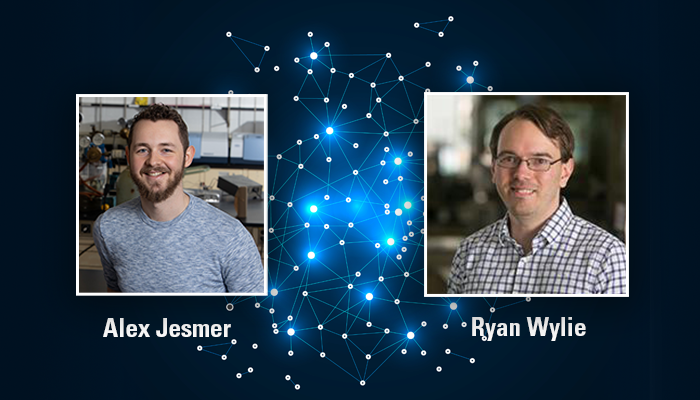Biochemistry and engineering collaboration leads to more accessible optical biosensor technology

By Eileen Hoftyzer
A collaboration between biochemists and engineering professionals has led to the creation of a new start-up company developing optical biosensors that can be used with standard lab equipment. The company, Wavesimplix Technologies, recently received the People’s Choice Award at the Residency’s Demo Day in October, which highlights the health innovations developed during each cohort of the program.
“The idea of using optical sensors to measure proteins is very well documented. But they are super expensive, and normally you have to go to a core facility to use such a sensor,” explains Alex Jesmer, a PhD graduate and former post-doctoral fellow at McMaster University and alumnus of the Health Innovation Bootcamp and Residency @ The Clinic. “Our novel twist on this is that we can use rudimentary optical systems to shine the light. Being able to buy a relatively inexpensive sensor and use it with the existing plate reader makes the technology more accessible, both for researchers and in educational settings.”
Jesmer earned a Bachelor of Science at the University of Ottawa, with a major in biochemistry and a minor in physics, before starting a PhD at McMaster University in the department of chemistry and chemical biology with supervisor Ryan Wylie, associate professor in the Faculty of Science and associate member of the McMaster School of Biomedical Engineering.
Jesmer’s PhD project brought together all of these different fields, starting as research to develop antifouling biomaterials, which are resistant to proteins or microorganism adherence and could be used for implants in the body. But as his research continued, he found that the same biomaterial could be applied as an optical biosensor to measure binding of specific proteins. With the expertise of biochemists and engineering professionals and working in the facility at the Centre for Emerging Device Technologies in the Faculty of Engineering, Jesmer adapted the biosensor to be used with a plate reader, a standard piece of equipment found in almost all biochemistry labs, making it highly accessible.
As Jesmer prepared to publish the research, he found out about the Health Innovation Bootcamp and decided to apply; throughout the program, he began working on grant applications and a business plan to further develop the technology.
In the fall of 2022, he started the Residency @ The Clinic, while completing a post-doctoral fellowship with Wylie, to continue advancing Wavesimplix.
At the same time Jesmer was working on his post-doctoral fellowship and residency, he also had a part-time role as a project scientist at the University of New Brunswick. He now lives full-time in New Brunswick and is CEO Forsta Varme Technologies Ltd., which is developing thermal management solutions, in addition to continuing to build and advance Wavesimplix, which is beginning its first educational pilot this winter.
“As a direct result of the work I did with the Bootcamp and the Residency, the experience in business and launching a start-up, I moved to a fulltime role as CEO,” says Jesmer. “There’s a direct throughline from those experiences to then getting this industry role.”
Jesmer says that both innovation programs provided an encouraging environment, a community of experts and like-minded students, and an enthusiastic mentor – all of which were critical in moving Wavesimplix from an idea to a company.
“Being around these experts and mentors, as well the community of students who were interested in not just doing research but applying it, was highly influential,” says Jesmer. “The whole reason the company moved forward was because I was in an environment where people expected you to put in the work to advance your idea, and that was incredibly valuable.”
Residency Highlight
